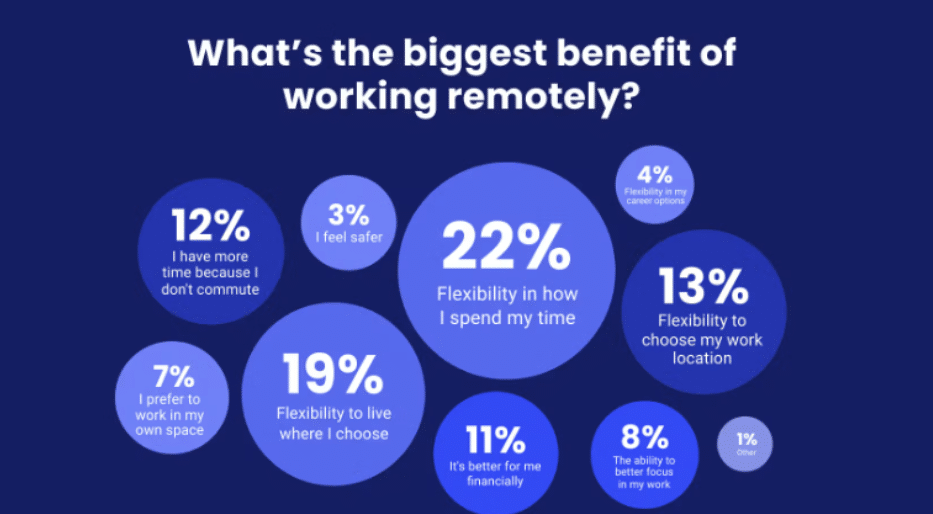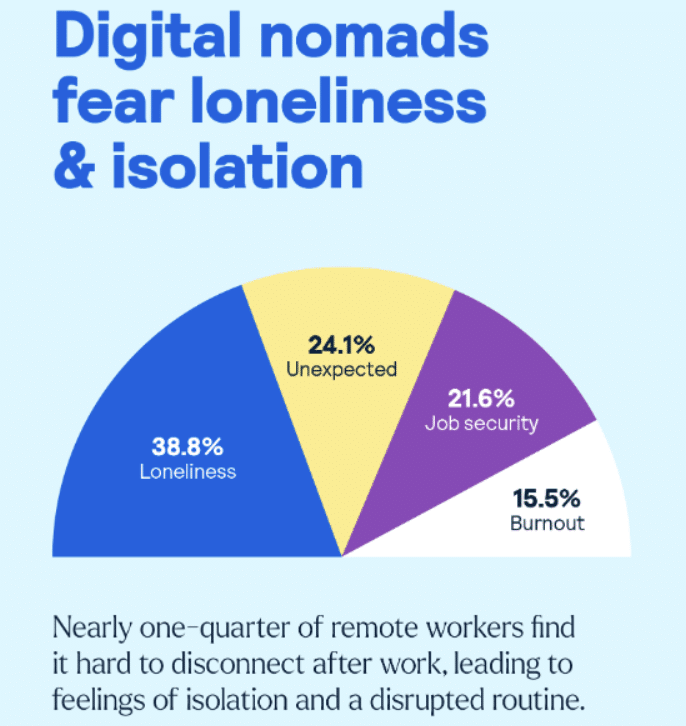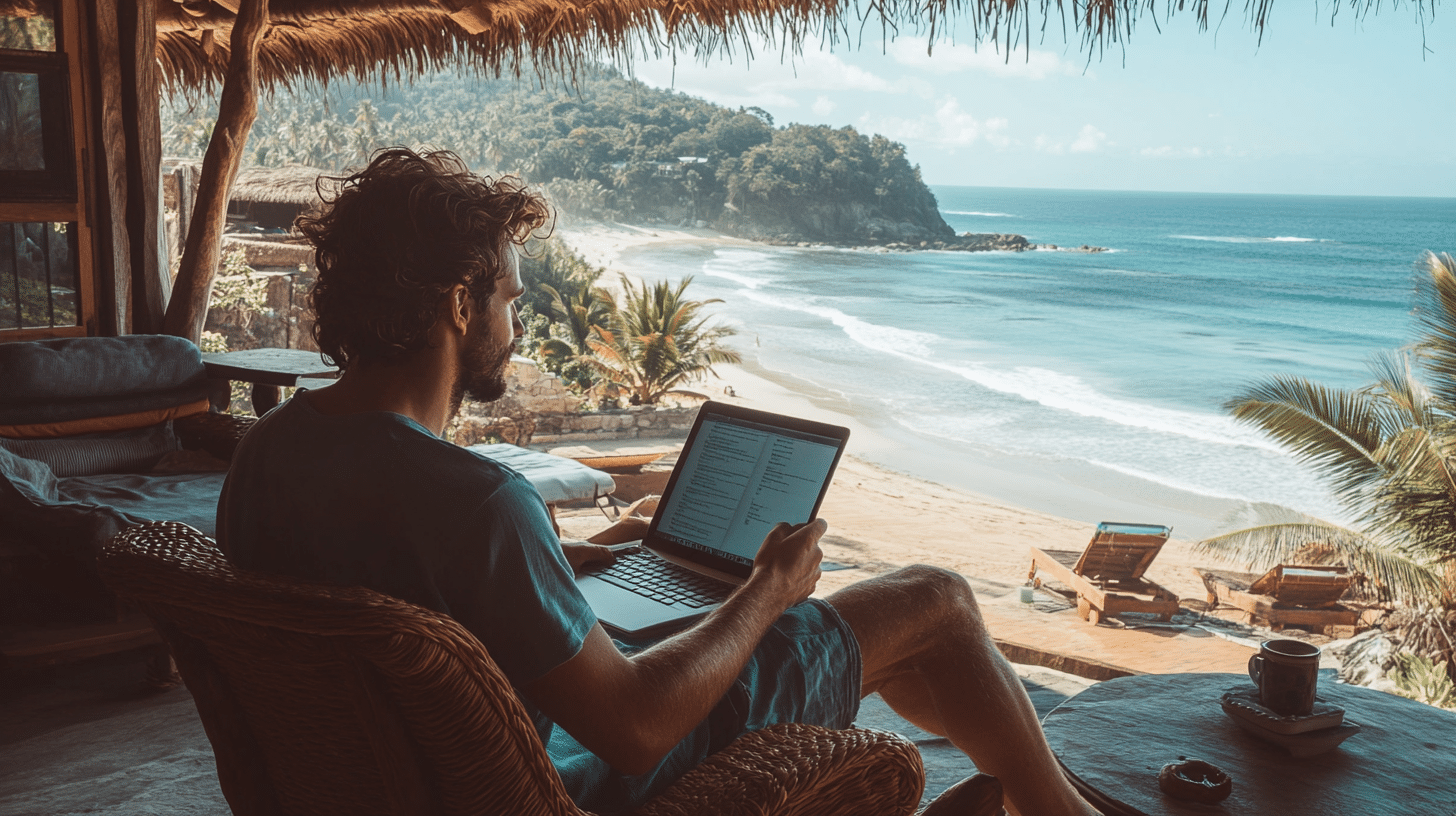You’ve probably seen the photos — someone working on a laptop from a beach in Bali, sipping coffee in a Lisbon café, or living the so-called dream from a mountain cabin with Wi-Fi. It looks perfect. And in 2025, the digital nomad lifestyle is more popular than ever. But behind those pretty posts is a life that’s not as easy as it seems.
So we’re going to cover everything — the good parts, the hard stuff, the real costs, and whether it’s something you can actually build a future on.
First Off, Let’s Talk About the Benefits of the Digital Nomad Lifestyle
Digital nomad lifestyle brings many advantages. Here are some.
👋 Psst…Have you seen the all-new Feedcoyote yet? They’ve got a new look, more freelance opportunities, and the best collaboration tool for freelancers! Join over 100,000 fellow freelancers who network, find clients, and grow their business with Feedcoyote. Join for Free »
You Get to Work from Anywhere
This is the biggest perk. You’re not stuck at a desk or a single city. You can work from a beach hut in Bali one month and a cozy Airbnb in Lisbon the next. As long as you have your laptop and Wi-Fi, you’re good to go.
In fact, according to a recent survey, 19% of remote workers say the biggest benefit of working remotely is the freedom to live where they choose.

You choose where you live, and that changes everything. No more commuting, no more cold offices with bad lighting. Instead, you can build a routine around places that inspire you. You feel more alive, more in control. And let’s be honest — even just waking up to a view you love makes work feel lighter.
You Can Save Money Living in Cheaper Places
Rent, food, transport — all of it can be way cheaper if you choose the right places. Instead of paying $2,500 for rent in a big city, you might spend $500 in a beautiful apartment in Thailand or Vietnam.
And we’re not talking about sacrificing comfort — many nomad hubs offer amazing quality of life. You can eat out more, do fun stuff on weekends, and still have money left to save. It’s not just about travel — it’s about living well while spending less.
Eli Pasternak, Founder & CEO of Liberty House Buying Group, points out, “When your income stays steady but your expenses drop, that freedom opens up new options fast.”
Not Stuck in One Routine
Every city you go to gives you a fresh start. You try new foods, walk different streets, and meet new people. It keeps you from feeling bored or stuck in the same pattern every day.
Even your workday shifts — maybe you work mornings in one country, and evenings in another. That change keeps your mind sharp. You become more adaptable, more curious. Life doesn’t feel like it’s passing you by.
You’re not waiting for the weekend or your next vacation — because your life already feels like one. That kind of mental shift can be a huge mood booster.

Learn to Live with Less
When you live out of a backpack or suitcase, you quickly learn what matters. You stop buying things you don’t need, and you start caring more about quality over quantity.
You choose one good pair of shoes instead of five. You pick tools and gear that work well and last. And guess what? You don’t miss the clutter. In fact, it feels good.
Your life becomes lighter — physically and mentally. You spend less time shopping, cleaning, or organizing stuff. Instead, you focus more on experiences, people, and places. That shift in mindset is freeing and often life-changing.
Meet People from All Over the World
Nomad life is full of interesting people. Co-working spaces, cafés, coliving spots — they’re full of folks doing cool things. And everyone has a story.
Some run businesses, some are freelancers, others are just figuring things out like you. You share meals, swap tips, maybe even work together. It’s a mix of personal and professional networking — and it often happens without you even trying.
These connections can lead to friendships, projects, or even partnerships. And because you’re meeting people from all over, your thinking expands too. You learn about other cultures, work styles, and ways of life. It’s real growth.
You Build New Habits Around Your Terms
When you’re always in motion, you’re not locked into old routines.
Want to start waking up early? Pick a quiet town. Want to focus on fitness? Stay near nature or a walkable city.
You’re not tied to old habits, people, or places. You build your days based on how you want to live — not what your city or job forces you into.
You also get to test new habits quickly. If something’s not working, you try again in the next place.
Grow Fast — Personally and Professionally
Being a digital nomad throws challenges at you — lost luggage, language barriers, finding Wi-Fi in a new city, or dealing with time zone issues. But every time you figure something out, you grow. You become more confident, more resourceful, more calm under pressure.
And that shows up in your work too. You learn to communicate better with clients, manage your time smarter, and juggle tasks across countries and schedules. You also discover new things about yourself — what you like, how you work best, and what kind of life feels right for you. That kind of growth is priceless.

Hamza G. Email Outreaching Expert at Outreaching.io, adds, “Living and working on the move teaches you how to adapt fast — and that skill translates directly into better outreach. You get better at reading people, crafting personalized messages, and building real connections across time zones.”
Escape the Office Politics
When you’re a digital nomad, you don’t have to deal with office drama, gossip, or awkward team lunches. There’s no pressure to “look busy” or pretend to care about things that don’t matter.
You’re judged by your work — not by who you sit next to or how often you join after-hours calls. That kind of freedom can be a relief. You focus more on results, less on appearances.
And since many nomads work for themselves or with global teams, there’s less small talk and more clear communication. It helps you stay focused, relaxed, and in control of your workday.
You Can Turn Travel into a Lifestyle
Most people wait all year for a two-week vacation. As a digital nomad, you don’t have to. Travel becomes part of your daily life, not something you squeeze in. You’re not rushing through cities with a packed schedule.
You take your time, get to know places, and actually live in them. That means you find the best local food, favorite coffee shops, and hidden spots tourists miss. You get to feel at home in more than one place.
The Hidden Costs and Real Trade-Offs
So let’s cover the drawbacks of the digital nomad lifestyle.
Loneliness Can Hit Hard
Moving around sounds fun — and it often is — but it can also get lonely. You’re constantly saying goodbye to people just as you get close to them. Friendships can feel temporary. You miss birthdays, weddings, or even just regular hangouts with people who really know you.
Sure, you’ll meet amazing people on the road, but sometimes you’ll find yourself craving deeper connections. After a while, it can feel exhausting to keep starting over. If you’re someone who values strong community ties or family time, this lifestyle can quietly wear you down in ways you didn’t expect.
In fact, a recent report found that 38.8% of digital nomads say loneliness is their biggest fear — more than concerns about job security or burnout.

It’s a real part of this lifestyle that many people don’t talk about upfront, but it hits harder the longer you stay on the move.
No Routine Means You Can Burn Out Fast
Traveling often feels like a break. But when you’re working full-time while switching cities, booking places to stay, figuring out Wi-Fi, and handling new cultures — it adds up.
Your days stop feeling structured. You work odd hours, sleep poorly, and sometimes forget to rest. Over time, that lack of rhythm can affect your health and focus.

According to Anup Kayastha, Founder of Checker.ai, “Many nomads burn out not because of work, but because of decision fatigue. Without a regular routine, even small things like finding a quiet spot to work or cooking a simple meal can feel like too much. It takes real effort to stay balanced.”
You’re Always Managing Visas, Rules, and Red Tape
Most countries don’t officially let you work while on a tourist visa, but that’s what many digital nomads do anyway — a legal grey area.
Every few weeks or months, you’re checking visa dates, applying for new ones, or flying out just to reset your stay. It’s not just annoying — it is risky.
Rules change fast, and one mistake could mean fines or being banned from re-entry. Even with new nomad visas available in 2025, not all of them are easy to get. There’s paperwork, fees, and time involved. You can’t just roam freely without thinking about it.
Healthcare and Emergencies Get Complicated
If you get sick in a new country, it’s not as simple as calling your doctor. You might not speak the language, not know the hospitals, or not be covered by your insurance.
Sure, you can buy travel health insurance, but it’s often limited or hard to use. If something serious happens, you could be far from home, family, or proper care. Even routine things like dental visits, prescriptions, or check-ups can become tricky.
When you’re constantly on the move, having reliable access to healthcare isn’t just important — it’s essential. Without a solid plan, small problems can quickly turn into major setbacks.
Your Finances Can Get Messy
Living and earning in different countries brings a lot of financial confusion.
- Which country do you pay taxes in?
- Do you need to file in your home country too?
- How do you manage banking, exchange rates, or invoices across borders?
If you’re freelancing or self-employed, it’s even more complex. One missed rule could lead to fines, frozen accounts, or lost money. Not every country makes it easy for foreigners to work online. You’ll need to figure out taxes, insurance, and retirement savings mostly on your own. And that’s a lot to manage while you’re also trying to stay productive.
Here are the tools and technologies that help digital nomads stay productive, connected, and in control while working from anywhere in the world.
Reliable Wi-Fi and Mobile Hotspots
Good internet is the backbone of the digital nomad lifestyle. You can’t do much without it — whether you’re sending emails, joining Zoom calls, or uploading work. That’s why many nomads travel with portable Wi-Fi devices or buy local SIM cards with strong data plans.
Mobile hotspots like Skyroam or even just tethering from your phone can save the day when café Wi-Fi fails. Steve Morris, Founder & CEO of NEWMEDIA, points out, “Before booking a place, most nomads check Wi-Fi speed reviews or ask the host directly. So having a backup plan for the internet is a must if you want to stay on track.”
Time Zone Tools to Keep Work in Sync
When your clients or team are in different time zones, it’s easy to get confused. You don’t want to miss meetings or send messages at 2 a.m. That’s why tools like World Time Buddy or Google Calendar’s time zone feature come in handy.
They help you plan your day around others without the guesswork. Many remote workers also set their phone or laptop to multiple clocks so they always know the time back home or at their client’s location. Staying organized with time zones saves you from awkward moments. And shows people you’re professional, even from miles away.
Communication Apps Like Slack and Zoom
Clear communication is key when you’re not in the same room. Slack, Zoom, Microsoft Teams, and WhatsApp make it easy to stay in touch no matter where you are.
Slack is great for quick updates and keeping work chats organized. And Zoom helps you jump on calls and feel connected, even when you’re halfway across the world.
These tools let you check in with your team, ask questions, and handle things fast. You don’t need to be in an office to stay in the loop — you just need the right apps and a good headset.
Project and Task Management Tools
When you’re managing your own time, staying organized is everything. Notion, Trello, Asana, and ClickUp help you keep track of what you’re working on. You can break big projects into smaller steps, set deadlines, and see your progress.
Some nomads use these tools just for work, others use them for their full life — travel plans, budgets, fitness, and even journaling. The key is keeping things out of your head and into a system.
When you know what needs to be done each day, it’s easier to relax and enjoy the nomad life without falling behind.
Cloud Storage and Backup Solutions
Losing your work is a nightmare — especially when you’re in a different country with no tech support. That’s why using cloud storage like Google Drive, Dropbox, or iCloud is so important.
These tools keep your files safe and accessible from anywhere. You can work from your laptop in the morning and check the same files from your phone later.
Some nomads also use backup drives or automatic syncing so nothing gets lost if their device breaks or goes missing. When your whole job depends on a laptop, backing up your work is necessary.
Tips to Make It Worth It in 2025
Follow these below tips to make digital nomad lifestyle better.
Start Slow and Test the Lifestyle
Don’t sell everything and jump on a plane right away. Start with a short trip — maybe one or two months — and see how it feels. Work your regular job from a different location and pay attention to what works and what doesn’t.
Dan Close, Founder and CEO at We Buy Houses in Kentucky, shares, “Testing the lifestyle first gives you clarity. You’ll quickly find out if the freedom really fits your day-to-day work style — before making any big life changes.”
Testing the lifestyle before going all in helps you avoid burnout, culture shock, and big regrets. It also gives you time to learn what kind of places and setups work best for you.
Choose Your Destinations Wisely
Not every city is great for digital nomads — even if it looks cool on Instagram. Before booking a flight, check the cost of living, Wi-Fi speed, safety, and visa rules. Look for places with a strong remote work community, good co-working spaces, and reliable transport.
Cities like Lisbon, Medellín, and Chiang Mai are popular for a reason — they balance comfort, cost, and community. The more research you do before going, the smoother your stay will be.
Keep a Simple Routine That Grounds You
When you’re always on the move, it’s easy to feel scattered. A simple daily routine can help you stay focused.
Start your day at the same time. Set clear work hours. Take real breaks. Move your body. Eat properly. It doesn’t need to be strict — just steady enough to keep you grounded.
Without a routine, the line between work and travel can blur fast, leaving you feeling like you’re doing neither properly. A little structure makes the freedom more enjoyable.”
Manage Your Money Carefully
One of the biggest reasons people quit the nomad life is money stress. Track your expenses, set a budget, and build an emergency fund. Use Wise or Revolut to avoid crazy fees when moving money across countries.
Also, think about taxes — find out where you’re supposed to file and don’t ignore it. You don’t need to be rich to live this lifestyle, but you do need to be smart with your money. Financial peace makes the whole thing a lot more fun.
Focus on Long-Term Skills
It’s easy to get caught up in beaches and travel photos. But if you want to make this life last, focus on building real skills — the kind that bring in steady income from anywhere. Whether it’s writing, coding, marketing, design, or coaching — keep learning and improving.
The stronger your skills, the more freedom you’ll have. You won’t just be chasing gigs — you’ll be choosing the work and life you actually want. That’s what makes it truly worth it in the long run.
Take Breaks from Travel
Constant travel might sound exciting, but it can wear you down over time. Different time zones, airports, noise, and new environments can drain your energy. That’s why it’s smart to pause now and then — stay put for a while, catch your breath, and focus on rest or deep work.
Spending a few months in one place doesn’t make you “less” of a digital nomad. In fact, it helps you experience local culture more deeply, build temporary routines, and enjoy a healthier pace. It also gives you a chance to reflect and plan your next move instead of just reacting to what’s next on the map.
Jimi Gecelter, CEO of Tradeit, states, Travel is great — but rest is part of the journey too. The best nomads know when to slow down to make the lifestyle last.”
Popular Destinations for Digital Nomads in 2025
With more countries welcoming remote workers, choosing the right place to live and work matters more than ever. Here are five cities digital nomads are flocking to in 2025.
1. Lisbon, Portugal
Lisbon continues to be a top pick for digital nomads — thanks to its stable internet, walkable neighborhoods, and growing remote work culture. The city has a mix of old charm and modern living — cobblestone streets, pastel buildings, and plenty of cafes with strong coffee and Wi-Fi.
And here English is widely spoken, which makes settling in easier. While prices have gone up, especially for rent, it’s still more affordable than other Western European capitals. The weather is mild most of the year, and the pace of life is relaxed.
2. Medellín, Colombia
Medellín has gone from overlooked to one of the most talked-about cities for remote workers. It offers a lower cost of living compared to most Western cities — with good public transport, fast internet, and a growing number of co-working spaces.
The city’s “eternal spring” climate means pleasant temperatures year-round. Areas like El Poblado and Laureles are especially popular among nomads due to safety, walkability, and access to cafes and community events. While Spanish helps, many locals in tourist areas speak basic English.
3. Chiang Mai, Thailand
Chiang Mai is favorite for digital nomads who prefer peace, affordability, and simplicity. It’s far less hectic than Bangkok, yet still offers everything a remote worker needs — good internet, co-working spaces, low living costs, and plenty of food options.
Apartments are cheap, and daily expenses are manageable even on a modest income. The nomad scene here is well-established, with meetups, networking events, and a helpful online community. Visas are tricky, but many nomads either renew through travel or apply for education or volunteer programs.
4. Tbilisi, Georgia
Tbilisi has been gaining attention among digital nomads due to its low cost of living and the relatively easy visa options — including a 1-year digital nomad visa.
The city blends Eastern European and Middle Eastern influences, with a unique culture, good food, and warm hospitality.
The internet is decent here, and many apartments come fully furnished at affordable prices. The lifestyle is slow-paced, and you can find everything from local bakeries to stylish cafes in walkable neighborhoods. While infrastructure is still catching up in some areas, the community is growing fast.
5. Bali, Indonesia
Bali has long been a hotspot for digital nomads, especially in areas like Canggu and Ubud. It offers a range of co-working spaces, healthy food options, and a large community of remote workers and entrepreneurs.
The cost of living varies — you can live cheaply or spend more for comfort — but it’s still affordable compared to Western standards. Internet quality can be hit or miss, but most nomad-friendly places offer solid Wi-Fi. What draws people in is the lifestyle — tropical views, yoga studios, motorbike rides, and a focus on personal wellness.
The Career Side: Who Is Actually Doing Well?
Not every job works with the digital nomad lifestyle. Some people struggle, while others do just fine. Here’s what actually works.
Freelancers Doing Remote Work
Freelancers often find it easier to live the digital nomad life. If you write, design, code, edit videos, or manage social media, you can work from anywhere. You usually set your own hours and choose your clients.
Martin Seeley, CEO & Senior Sleep Expert at Mattress Next Day, suggests, “As long as you stay organized and deliver on time, clients don’t care where you’re working from. Many freelancers use Upwork or Fiverr to get started, then build long-term clients from there.”
It’s not always stable in the beginning, but over time, it can give you the freedom to travel and work on your own terms.
Full-Time Remote Employees
People with remote jobs at companies can also live as digital nomads — but it depends on the job and time zones. If you work for a company that lets you work from anywhere, you’ll still need to show up for meetings and be online during certain hours. That can be hard if you’re in a different part of the world.
Some employees adjust their travel plans to match work hours. Others pick cities with similar time zones. If the company supports remote work fully, this setup is a good balance of steady income and location freedom.
Online Business Owners
Running your own business online gives you more freedom than most. You’re not answering to a boss or client — you set your own schedule and choose what to work on.
Many nomads build businesses around digital products, coaching, e-commerce, or services like consulting. It’s not easy in the beginning, and it takes time to build income you can depend on.
But once the systems are in place, it becomes easier to travel without worrying about every little detail.
People Earning Passive Income
This is the most flexible type of work. Passive income comes from things like online courses, YouTube, affiliate marketing, or digital downloads. Once you’ve done the hard work upfront, you can keep earning without working every single day.
Of course, it’s never fully passive — you still have to check in, update content, and respond to customers. But it gives you more time to explore new places or take days off without falling behind. This setup works well for nomads who want to travel slow and avoid being glued to a laptop all day.
People with Tech or Creative Skills
Some skills work better for the nomad lifestyle. If you’re good at something that can be done online — like web development, UX/UI design, SEO, writing, video editing, or digital marketing — you’re already in a good spot.
These jobs are in demand, and you can find work from clients all over the world. The better your skill, the more you can charge. You don’t have to chase low-paying gigs forever.
Learning these skills doesn’t happen overnight, but if you’re willing to improve and stay up-to-date, they can carry you through a long-term remote career.
Who Should Probably Think Twice Before Going Nomad
The digital nomad lifestyle looks amazing on social media. But the truth is — it’s not for everyone.
If you take care of family members, have kids in school, or have health needs that require regular check-ups, this lifestyle is complicated for you. Because not every country has good healthcare, and even if it does, it might not be easy to find help when you need it.
Travel insurance can cover some things, but not everything. Plus, if something goes wrong — whether with your health or back home — being far away can leave you feeling helpless. Nomad life gives you space, but sometimes that space can feel too far when you need people close by.
In an interview, Malcolm Ferrante, Senior Manager – Immigration and Relocation of CSBGroup, said, “When you’re relocating or working abroad, health and family considerations are more than logistical — they’re emotional. Having the right support network and local knowledge can make a huge difference in how manageable and safe the experience feels.”
Final Thoughts: Is It Something You Should Try?
The digital nomad lifestyle is worth a try, but only if it fits the kind of life you want. It works well for people who enjoy freedom, like change, and can stay focused without much help.
But it’s not always fun. You might feel lonely, worry about money, or struggle to work in noisy places. If you need routine or want to stay close to family, this lifestyle can feel a bit too much.
So the best thing you can do is take it slow. Try it for a short time and see if it feels right for you.
Keep the conversation going…
Over 10,000 of us are having daily conversations over in our free Facebook group and we’d love to see you there. Join us!

